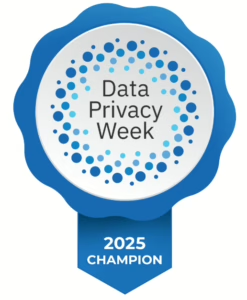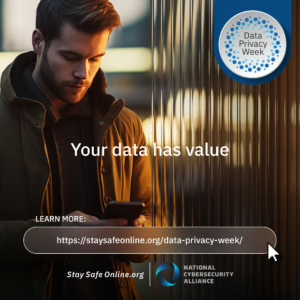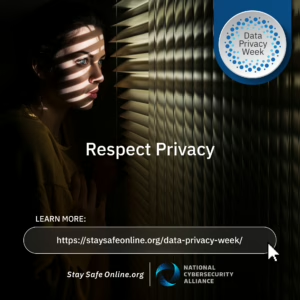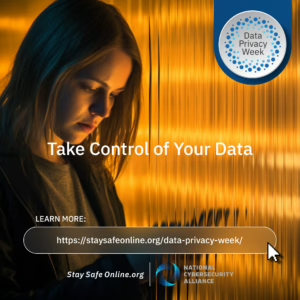
What is data privacy week?
Data Privacy Week is an annual expanded effort from Data Privacy Day — taking place from January 27 – 31, 2025. The goal of Data Privacy Week is to spread awareness about online privacy among individuals and organizations. The goal is twofold: to help citizens understand that they have the power to manage their data and to help organizations understand why it is important that they respect their users’ data.
TAKE CONTROL OF YOUR DATA
All your online activity generates a trail of data. Websites, apps, and services collect data on your behaviors, interests, and purchases. Sometimes, this includes personal data, like your Social Security and driver’s license numbers. It can even include data about your physical self, like health data – think about how a smartwatch counts and records how many steps you take.
While it’s true that you cannot control how each byte of data about you and your family is shared and processed, you are not helpless! In many cases, you can control how you share your data with a few simple steps. Remember, your data is precious, and you deserve to be selective about who you share it with!

WHAT IS DATA PRIVACY?
We believe that privacy is a right. At its core, privacy is the fundamental right to control access to your personal life and information. This includes the right to keep certain information unseen or undisturbed by others. From the vantage point of the 2020s, you’re probably aware that the concept of privacy has evolved significantly. Let’s work together to protect our digital spaces, which include your online identity, browsing habits, and even the messages you send. The right to privacy in this context means safeguarding your information from unwanted or unnecessary access.
UNDERSTANDING YOUR DATA
Data privacy centers on the right to protect personal information online. The sheer volume of data generated daily—from names and birthdates to medical records and browsing habits—is staggering. Even though so much is created, this data is highly valued by businesses and advertisers.
Types of personal data
Your personal data includes identifiable information such as your name, address, phone number, date of birth, and Social Security number. It also includes data about your behavior online, like the websites you visit, the products you buy, and even how long you stay on a webpage. Spending a few minutes streaming a video, perusing a webpage, or playing around on an app creates thousands to millions of data points.
Data is big business
Advertisers and other companies, such as so-called data brokers, prize this information. They collect it to
create tailored ads, track purchasing trends, and study behavior. Often, companies “anonymize” data before selling it, but this anonymization doesn’t entirely remove the privacy risk.
Data privacy vs. cybersecurity
While data privacy focuses on who has access to your data, cybersecurity is about protecting that data from hacking, malware, and other online threats. They work hand-in-hand, as secure systems help keep your data private, but we must stay informed and make intelligent privacy choices.

WHY IS DATA PRIVACY IMPORTANT?
You may wonder why data privacy matters if “everything is already online.” But imagine this: you search for a product, and suddenly ads for it appear everywhere. Or perhaps you’ve downloaded an app that demands access to your contacts or emails, which it then sells to advertisers.
What is Data Privacy and Why Should You Care?
Here’s why data privacy matters:
Security: With more data shared online, the risk of unauthorized access increases. Protecting sensitive information like health records or financial details reduces the chance of them being misused.
Choice: Being aware of data privacy allows you to make informed choices about what to share. Many apps or websites might request access to data they don’t truly need—understanding your rights means you can decide what data you’re comfortable sharing.
Balancing privacy and convenience: Data privacy often involves trade-offs. For example, a maps app needs location data to provide directions. Knowing how to balance these choices helps you manage what data you disclose.

You have a say in your data privacy
Now that you understand why data privacy is essential, here are some practical steps you can take to protect your privacy in 2025!
- Know what you can’t control
Some data sharing is unavoidable. For instance, the IRS needs your income details. Similarly, many services, like navigation apps, require some data to function. Understand these limits so you can focus on what you can control. - Cultivate a data privacy habit
When apps or websites request access, ask yourself: Why does this app need this information? Simple games may ask for location data, which is likely unnecessary. Fortunately, many devices let you choose whether to grant data access. Think carefully before clicking “Allow” on any data request and deny permissions that don’t make sense. - Check your settings regularly
Even if an app doesn’t directly ask for data, it may still collect it. Periodically checking your privacy settings (monthly is a good habit) helps ensure your data-sharing preferences align with your comfort level. Here are a few tips: Turn off permissions like location, camera, or microphone access unless needed. Limit apps to access certain data only “while using” rather than “always.” - Perform an app audit
Apps can collect data even if you aren’t actively using them. Every few months, review your apps and delete any you haven’t used recently. This simple step prevents unnecessary data collection and reduces clutter on your device. If you ever need the app again, you can easily reinstall it!
Write your own data story
While you can’t always control how your data is shared, you can stand up for your data. Advertisers and tech companies think your data is valuable, and so should you! When you think of data as currency, these data privacy best practices empower you to control what you share and with whom. Making informed choices gives you peace of mind and a sense of agency in your digital life.
Remember, data privacy is your right. Celebrate Data Privacy Week 2025 by sharing this guide with others so they can take control of their digital presence.
For more information about Data Privacy Week and how to get involved, visit https://www.staysafeonline.org/data-privacy-week.
About Assumed
Assumed is built for security-minded professionals including CISOs, compliance officers, privacy staff, lawyers, auditors, marketing managers, call center customers, business owners and everyone that has a vested interest in protecting the sensitive data under their care. We provide artificial contacts – Assumed Seeds – as honey tokens for simple, effective data leak monitoring, vetting data partners, and validating consumer experiences. With Assumed, you can ensure that your partners handle their data as they claim, validate your lead/sales processes, and monitor your databases for unauthorized access or theft. Don’t just assume; verify with Assumed.
About Data Privacy Week
Data Privacy Week began as Data Privacy Day in the United States and Canada in January 2008 as an extension of the Data Protection Day celebration in Europe. Data Protection Day commemorates the Jan. 28, 1981, signing of Convention 108, the first legally binding international treaty dealing with privacy and data protection. NCA, the nation’s leading nonprofit, public-private partnership promoting cybersecurity and privacy education and awareness, leads the effort in North America each year. For more information, visit https://staysafeonline.org/data-privacy-week/.
About the National Cybersecurity Alliance
The National Cybersecurity Alliance is a non-profit organization on a mission to create a more secure, interconnected world. We advocate for the safe use of all technology and educate everyone on how best to protect ourselves, our families, and our organizations from cybercrime. We create strong partnerships between governments and corporations to amplify our message and to foster a greater “digital” good. For more information, please visit https://staysafeonline.org.

